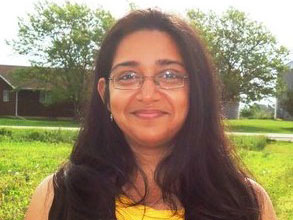
Sreerupa Ray
Sreerupa Ray
Associate Professor

Graf Hall 239
Education
- B.S., M.S., microbiology, Bangalore University
- Ph.D., biochemistry, Louisiana State University
- Postdoctoral Fellow, UT MD Anderson Cancer Center
- Postdoctoral Associate, Yale University, School of Medicine
Academic interests
Cancer is a disease characterized by uncontrolled growth of abnormal cells in the body. One of the major causes of cancer is mutagenesis. DNA is the repository of genetic information and its integrity is crucial for genome stability. Several exogenous and endogenous factors damage the DNA and if not repaired lead to mutagenesis, genomic instability and cancer.
Several databases, including 1000 Genomes, Cbioportal, The Cancer Genome Atlas (TCGA), and the Catalog of Somatic Mutations in Cancer (COSMIC) continue to catalog several cancer-associated variants of DNA repair genes. However, the biological functions of these mutations and the effect in response to therapy are not known.
My lab focuses on studying:
- How cancer-associated variants of DNA repair genes (such as MRE11, EXO1, RBBP8) induce genomic instability
- Cellular response of the cancer-associated variants to DNA damaging agents
- How cancer-associated variants impact the efficacy of therapeutics
My lab will use molecular biology, cell biology and biochemistry tools to study the cancer-associated variants involved in genomic instability and cancer. The long-term objective of my laboratory is to understand how aberrant DNA repair is linked to carcinogenesis. This will provide insight for assessing DNA repair genes as therapeutic targets.
Publications
Harris C, Savas J, Ray S., Shanle EK. Yeast-based screening of cancer mutations in the DNA damage response protein Mre11 demonstrates importance of conserved capping domain residues. Mol Biol Rep. 2021 Jun 1. doi: 10.1007/s11033-021-06424-8.
Ray, S., Breuer, G., Deveaux, M., Bindra, R., Zelterman, D. and Sweasy, JB. DNA polymerase beta participates in DNA End-joining, Nucleic Acids Research, Volume 46, Issue 1, 9 January 2018, Pages 242–255.
Alnajjar , K., Ray , S., Schechter, AN., Senejani, AG., Robison, S., Criswell, LS., Dragon, J. and Sweasy, JB. Base Excision Repair in the Etiology of Lupus and Cancer. The Base Excision Repair Pathway: pp. 449-499. (2017). Book Chapter.
Sohl, CD., Ray, S. and Sweasy, JB. Pools and Pols: Mechanism of a mutator phenotype. Proc Natl Acad Sci U S A. (2015) Apr 30. pii: 201505169. Commentary.
Ray, S., Menezes, MR., Senejani, AG. and Sweasy, JB. Cellular Roles of DNA Polymerase Beta. Yale J Biol Med. (2013). Dec 13;86(4):463-469. Review.
Ray, S. and Grove, A. Interaction of Saccharomyces cerevisiae HMO2 domains with distorted DNA. Biochemistry (2012). Mar 6;51(9):1825-35.
Ray, S. and Grove, A. The yeast high mobility group protein HMO2, a subunit of the chromatin-remodeling complex INO80, binds DNA ends. Nucleic Acids Res. (2009). 37(19), 6389–6399.
Wowor, A. J., Datta, K., Brown, H. S., Thompson, G. S., Ray, S., Grove, A. and LiCata, V.J. Thermodynamics of the DNA structural selectivity of the Pol I DNA polymerases from Escherichia coli and Thermus aquaticus. Biophys. J. (2010). 98(12), 3015-24
Grants
Feb. 2021: Crawford-Beck Vineyard Endowment in support of the research project, “Elucidating the role of variants of EXO1 in DNA damage response.” $1228.
Sept. 2021-Aug. 2024: National Institute of General Medical Sciences-NIH “Uncovering the mechanistic
role of Polymerase Theta in UV-damage repair.” # IR15GM144903-01. Subaward recipient $7000.00. Linfield Indirect Cost $2590.
Jun. 2021: National Cancer Institute -NIH- Elucidating the Role of Mre11 Variants in a Pathological Context # 1 R15 CA271150-01. (Not funded.)
Feb. 2021: Crawford-Beck Vineyard Endowment in support of the research project, “Elucidating the role of cancer-associated variants of EXO1 in ultra-violet radiation-induced DNA damage response.” $2122.
Mar. 2019-Apr. 2022: Murdock College Research Program for Natural Sciences – Life Sciences Grant (#201812085) $60,000, Elucidating Cancer Risk in MRE11 Genetic Variants (Linfield University match $29,419.)
Jun. 2018: Reinke, C.; Bestwick, M.; Ray, S (co-PI).; “Proposal Request for Molecular Genetic Organism Equipment.” Funded through E. L. Wiegand Foundation (#2454): $53,500. Acquired equipment for research and teaching, including a (1) Fluorescence stereomicroscope and imaging system, (2) thermal cycler, (3)
refrigerated micro-centrifuge, and (4) digital incubator.
May 2022: Received Linfield University Faculty-student research collaborative grant. Award of $10,288.50, ($8788.50 to work with three undergraduates) on “Elucidating the role of Mre11 mutation in DNA repair.” $1,500 for supplies and a $2,000 faculty stipend.
Apr. 2019: Received Linfield University Faculty-student research collaborative grant. Award of $9023.25, ($7,323.25 to work with three undergraduates) on “Characterization of DNA repair gene variants in cancer.” $1,700 for supplies.
Apr. 2018: Received Linfield University Faculty-student research collaborative grant. Award of $9998.25, ($6,998.25 to work with three undergraduates on “Characterization DNA repair gene variants in cancer.” $1,000 for supplies and a $2,000 faculty stipend.
Jul. 2011-Mar. 2013: Received Baker Fellowship for Postdoctoral Research, The University of Texas
MD Anderson Cancer Center, Smithville.